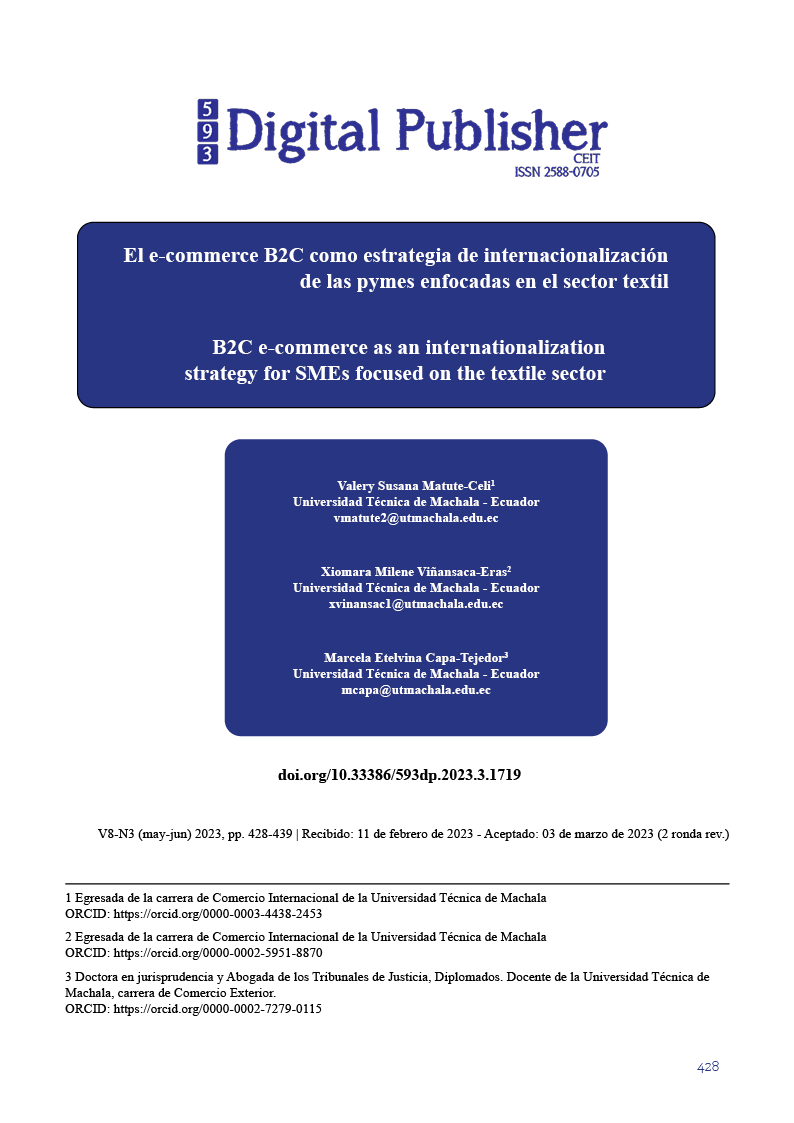B2C e-commerce as an internationalization strategy for SMEs focused on the textile sector
Main Article Content
Abstract
The textile sector is the second most important item of the Ecuadorian economy, however, it presents problems to enter an internationalization process, for this purpose the B2C electronic commerce model is presented as an alternative to offer products and services in international markets, without the need to have a physical space in another national territory. Consequently, the following work was established as an objective to analyze B2C electronic commerce as an internationalization strategy for SMEs in the textile sector, through documentary review. It is research with a qualitative approach and descriptive scope that applied the historical-logical, inductive-deductive, analytical-synthetic and systematization methods. The results obtained through the processing of information from other research works and the application of a survey to 11 SMEs in the textile sector indicate that the B2C channels the exit to the international market through its different sales modes that allow them to obtain international expansion, increase of market share, digital export and that most textile SMEs are unaware of the B2C model, however they apply social networks but are not focusing on their internationalization process. It is concluded that B2C enhances the internationalization of SMEs through the facilities and digital tools it provides.
Downloads
Article Details

This work is licensed under a Creative Commons Attribution-NonCommercial-ShareAlike 4.0 International License.
1. Derechos de autor
Las obras que se publican en 593 Digital Publisher CEIT están sujetas a los siguientes términos:
1.1. 593 Digital Publisher CEIT, conserva los derechos patrimoniales (copyright) de las obras publicadas, favorece y permite la reutilización de las mismas bajo la licencia Licencia Creative Commons 4.0 de Reconocimiento-NoComercial-CompartirIgual 4.0, por lo cual se pueden copiar, usar, difundir, transmitir y exponer públicamente, siempre que:
1.1.a. Se cite la autoría y fuente original de su publicación (revista, editorial, URL).
1.1.b. No se usen para fines comerciales u onerosos.
1.1.c. Se mencione la existencia y especificaciones de esta licencia de uso.
References
Alderete, M., & Jones, C. (2019). ¿Hacia el social commerce? El valor de las redes sociales en la MiPyME de Córdoba, Argentina. Entramado, 15(1), 1-22. https://doi.org/https://doi.org/10.18041/1900-3803/entramado.1.5149
Alvarado Lagunas, E. (2021). Determinantes del gasto en e-commerce debido a la COVID-19: un análisis empírico para los micronegocios en Monterrey, México. Paradigma económico. Revista de economía regional, 13(1), 119-145. https://www.redalyc.org/journal/4315/431566320005/431566320005.pdf
Álvarez, I., & Marín, R. (2020). Comercio electrónico y redes de producción global. Ekonomiaz: Revista vasca de economía, 98(2), 278-295. https://dialnet.unirioja.es/servlet/articulo?codigo=7694320
Barrientos Felipa, P. (2017). Marketing + internet = e-commerce: oportunidades y desafíos. Revista Finanzas y Política Económica, 9(1), 41-56. https://doi.org/https://doi.org/10.14718/revfinanzpolitecon.2017.9.1.3
Bednarz, Z. (2016). Breach of information duties in the B2C e-commerce: adequacy of available remedies. Revista de Internet, Derecho y Política(22), 2-18. https://www.redalyc.org/articulo.oa?id=78846481002
Bojórquez, M., & Vazuelos, O. (2017). EL COMERCIO ELECTRÓNICO COMO ESTRATEGIA DE INTERNACIONALIZACIÓN DE LAS PYMES. RITI Journal, 5(10), 110-113. https://dialnet.unirioja.es/descarga/articulo/7107421.pdf
Cardona Arenas, C., Quintero Renaud, S., Mora Quintero, M., & Castro Cardona, J. (2022). INFLUENCIA DEL COMERCIO ELECTRÓNICO EN EL DESEMPEÑO FINANCIERO DE LAS PYMES EN MANIZALES, COLOMBIA. Innovar, 32(84), 75-96. https://doi.org/https://doi.org/10.15446/innovar.v32n84.100594
Carranco Gudiño, R. (2017). LA APORTACIÓN DE LAS PEQUEÑAS Y MEDIANAS EMPRESAS (PYMES) EN LA ECONOMÍA ECUATORIANA. CIICAE-UIDE, 146-157. https://www.uv.mx/iiesca/files/2018/03/14CA201702.pdf
Carrión González, J. T. (2020). El impacto del e-commerce en las Pymes de la provincia de El Oro. Universidad y Sociedad, 12(2), 473-479. http://scielo.sld.cu/pdf/rus/v12n2/2218-3620-rus-12-02-473.pdf
Chiusoli, C. L., & Bonfim, R. S. (2020). E-commerce: o comportamento de compras on-line na percepção dos consumidores. Revista Administração em Diálogo - RAD, 22(2), 115-133. https://doi.org/https://doi.org/10.23925/2178-0080.2020v22i2.46989
Elia, S., Giuffrida, M., Mariani, M., & Bresciani, S. (2021). Resources and digital export: An RBV perspective on the role of digital technologies and capabilities in cross-border e-commerce. Journal of Business Research, 132, 158-169. https://doi.org/https://doi.org/10.1016/j.jbusres.2021.04.010
Estrategia Nacional de Comercio Electrónico. (Mayo de 2021). ESTRATEGIA NACIONAL DE COMERCIO ELECTRÓNICO. Ministerio de Telecomunicaciones y de la Sociedad de la Información: https://www.telecomunicaciones.gob.ec/wp-content/uploads/2021/05/ESTRATEGIA-NACIONAL_ENCE.pdf
Ferrer Vega, S. (2016). ANÁLISIS DEL SECTOR TEXTIL DE LA PROVINCIA DE EL ORO Y OPORTUNIDADES DE DESARROLLO A TRAVÉS DE PROGRAMAS DE EXPORTACIÓN. Machala: Universidad Técnica de Machala. http://repositorio.utmachala.edu.ec/bitstream/48000/9340/1/ECUACE-2016-CI-DE00037.pdf
Frasquet Deltoro, M., Mollá Descals, A., & Ruiz Molina, M. (2012). Factores determinantes y consecuencias de la adopción del comercio electrónico B2C:una comparativa internacional. Estudios gerenciales, 28(123), 101-120. https://doi.org/https://doi.org/10.1016/S0123-5923(12)70207-3
Godoy Rosero, P. C., Rentería Macías, H. J., Hurtado Sotalin, D. M., Plata Cabrera, C. S., Nazareno Arteaga, I. M., Barboza Quintero, G., & Cortez Altafuya, J. J. (Abril de 2022). Análisis del E-commerce en el entorno comercial basado en la aplicación de las TICs. Polo del Conocimiento, 7(4), 963-978. https://doi.org/10.23857/pc.v7i4.3869
Goncalves, M., & Cornelious, E. (2019). Lusophone-African SME internationalization: A case for born global and international joint ventures. Journal of Transnational Management, 24(3), 231-258. https://doi.org/https://doi.org/10.1080/15475778.2019.1634406
Küster Boluda, A. (2020). La gestion de quejas y reclamaciones B2B en el contexto internacional. Universitat de València. https://roderic.uv.es/bitstream/handle/10550/76082/M%20Amparo%20Kuster%20Boluda_Tesis%20Marketing_A4_2020%2010%2021.pdf?sequence=1&isAllowed=n
Kwok, L., Zhang, F., Huang, Y.-K., Yu, B., Mahaarabhushanam, P., & Rangan, K. (2015). Documenting business-to-consumer (B2C) communications on Facebook: What have changed among restaurants and consumers? Worldwide Hospitality and Tourism Themes, 7(3), 283-294. https://doi.org/https://doi.org/10.1108/WHATT-03-2015-0018
Liceras, P. (01 de Junio de 2021). ¿En qué consiste el B2C? Hablemos de empresas: https://hablemosdeempresas.com/empresa/en-que-consiste-el-b2c/
López, B., San Martín, S., & Jiménez, N. (2016). El éxito del Comercio Móvil B2C: Factores de Adopción y Propuestas de Valor de las Empresas. Cuadernos de Estudios Empresariales, 26, 61-78. https://doi.org/http://dx.doi.org/10.5209/CESE.54159
Malvestiti, R., Esteves, D., & Dandolini, G. (2021). ABSORPTIVE CAPACITY AS FEEDBACK ON THE SUSTAINABILITY OF ORGANIZATIONS. RAM. Revista de Administração Mackenzie, 22(1), 1-29. https://doi.org/https://www.redalyc.org/journal/1954/195468229006/195468229006.pdf
Minhas, A., & Emilsson, S. (2022). How can an organization with B2B experience enter a new market utilizing an B2C e-commerce strategy instead? A case study of a fragrance company. Halmstad University, 3(301), 1-56. https://www.diva-portal.org/smash/get/diva2:1675032/FULLTEXT01.pdf
OECD. (2019). Unpacking E-commerce: Business Models, Trends and Policies. París, Paris: OECD Publishing. https://doi.org/https://doi.org/10.1787/23561431-en
Otzen, T., & Manterola, C. (2017). Técnicas de Muestreo sobre una Población a Estudio. International Journal of Morphology, 35(1), 227-232. https://doi.org/https://dx.doi.org/10.4067/S0717-95022017000100037
Palate Oña, L., Guananga Sánchez, W., & Chávez Yépez, H. (2021). Innovación comercial mediante plataformas B2C para la industria del calzado de la provincia de Tungurahua. Uniandes Episteme, 8(2), 307-321. https://dialnet.unirioja.es/descarga/articulo/8298158.pdf
Perdigón Llanes, R., Viltres Sala, H., & Madrigal Leiva, I. R. (2018). Estrategias de comercio electrónico y marketing digital para pequeñas y medianas empresas. Revista Cubana de Ciencias Informáticas, 12(3), 192-208. http://scielo.sld.cu/scielo.php?script=sci_arttext&pid=S2227-18992018000300014&lng=es&tlng=es
Pereira Ebert, P., Seide Froemming, L., & Johann, D. (2018). Franquias Virtuais, uma Nova Estratégia para os Varejistas no E-Commerce. Desenvolvimento em Questão, 16(45), 377-396. https://doi.org/https://doi.org/10.21527/2237-6453.2018.45.377-399
Pérez González, Á., & Pérez Narváez, M. (2018). El proceso de internacionalización de un proyecto empresarial. Cádiz: Cátedra de Emprendedores Universidad de Cádiz. https://emprendedores.uca.es/wp-content/uploads/2018/02/7-proceso-internacionalizacion.pdf
Pesántez-Calva, A., Romero-Correa, J., & González-Illezcas, M. (Enero de 2020). Comercio electrónico B2B como estrategia competitiva en el comercio internacional: Desafíos para Ecuador. INNOVA Research Journal, 5(1), 72-93. https://doi.org/https://doi.org/10.33890/innova.v5.n1.2020.1166
Pintado Valladolid, C. (2020). ANÁLISIS DE LA ADOPCIÓN DE HERRAMIENTAS DE COMERCIO EN LÍNEA POR PARTE DE LAS MIPYMES DEL SECTOR TEXTIL EN EL CANTÓN CUENCA. Universidad Politécnica Salesiana. Cuenca: Universidad Politécnica Salesiana. https://dspace.ups.edu.ec/bitstream/123456789/19569/1/UPS-CT008899.pdf
Portalanza, A., Bernal, J., Duque, J., Barbery, D., Villacís, G., Dakduk, S., Rodriguez, H., & Otatti, L. (28 de Septiembre de 2022). Cámara Ecuatoriana de Comercio Electrónico. Estudio de transacciones no Presenciales en Ecuador: https://online.uees.edu.ec/investigacion/presentacion-de-resultados-del-estudio-de-transacciones-no-presenciales-en-ecuador
Rodríguez, R., & Aviles, V. (2020). Las PYMES en Ecuador. Un análisis necesario. 593 Digital Publisher CEIT, 5(5-1), 191-200. https://doi.org/https://doi.org/10.33386/593dp.2020.5-1.337
Roiting. (s.f.). Plan de operaciones para un ecommerce. Retrieved 03 de Marzo de 2023, from Roiting: https://www.roiting.com/blog/plan-operaciones-ecommerce/
Rojas Torrijos, J. (2018). La estrategia digital de internacionalización de Marca en Latinoamérica. Revista de Comunicación, 17(1), 133-152. https://doi.org/https://doi.org/10.26441/RC17.1-2018-A7
Salas-Rubio, M. I., Ábrego-Almazán, D., & Mendoza-Gómez, J. (Marzo de 2021). Intención, actitud y uso real del e-commerce. Investigación Administrativa, 50(127), 153-173. https://doi.org/https://doi.org/10.35426/iav50n127.03
Sánchez Flores, F. A. (2019). Fundamentos Epistémicos de la Investigación Cualitativa y Cuantitativa: Consensos y Disensos. Revista Digital de Investigación en Docencia Universitaria, 13(1), 102-122. https://doi.org/doi: https://doi.org/10.19083/ridu.2019.644
Sarango-Lalangui, P., Álvarez-García, J., & Del Rio-Rama, M. (2018). Sustainable Practices in Small and Medium-Sized Enterprises in Ecuador. Sustainability, 10(6), 2105. https://doi.org/https://doi.org/10.3390/su10062105
Sierra Arias, J., Caro Arroyo, J., Suarez Ramírez, R., & Álvarez Puello, S. (2022). Comercio electrónico y las tendencias tributarias del sector gastronómico en Colombia durante la COVID-19. Revista de Ciencias Sociales, 28(2), 217-232. https://dialnet.unirioja.es/servlet/articulo?codigo=8378012
Sigmond, K. (2018). El comercio electrónico en los tratados de libre comercio de México. IUS Revista del Instituto de Ciencias Jurídicas de Puebla, 12(41), 359-377. http://www.scielo.org.mx/scielo.php?script=sci_arttext&pid=S1870-21472018000100359&lng=es&tlng=es
Statista Research Department. (Febrero de 2022). Porcentaje de la población con acceso a internet en algunos países y territorios de América Latina y Caribe por país en enero de 2022. Statista: https://es.statista.com/estadisticas/1136646/tasa-penetracion-mas-altas-internet-america-latina-caribe/
Suárez Forero, D. I. (2022). El comercio electrónico B2C como estrategia innovadora para las organizaciones en el siglo XXI. BOGOTÁ: UNIVERSIDAD MILITAR NUEVA GRANADA. http://hdl.handle.net/10654/41546
Valdivieso-Bonilla, A., Siluk, J. C., & de Freitas Michelin, C. (2022). ANÁLISIS PROSPECTIVO ESTRATÉGICO DEL SECTOR TEXTIL PRODUCTIVO ECUATORIANO PARA INCREMENTAR LA COMPETITIVIDAD EN LAS EXPORTACIONES. REVISTA DE INVESTIGACIÓN SIGMA, 9(2), 12-24. https://doi.org/https://doi.org/10.24133/sigma.v9i02.2827
Villacres Guato, G., Romero Fernández, A., & Gallegos Riofrio, R. (2022). Gestión de proceso de ventas para el mejoramiento de la rentabilidad. CIENCIAMATRIA, 8(15), 154-171. https://dialnet.unirioja.es/servlet/articulo?codigo=8625118
Zambrano Velasco, B., Castellanos Espinoza, E., & Miranda Guatumillo, M. (2021). El E-Commerce en las empresas ecuatorianas: Un análisis de los informes de la Cámara Ecuatoriana de Comercio Electrónico (CECE) en el marco de la pandemia covid-19. Revista Publicando, 8(29), 13-20. https://doi.org/https://doi.org/10.51528/rp.vol8.id2176
Zamora, A. (2015). Disrupción digital: El efecto multiplicador de la economía digital. Accenture Strategy. https://circulodeempresarios.org/transformacion-digital/wp-content/uploads/PublicacionesInteres/06.Accenture-Strategy-Digital-Disruption-Growth-Multiplier-Spanish.pdf
Zhang, J., & Du, M. (2020). Utilization and effectiveness of social media message strategy: how B2B brands differ from B2C brands. Journal of Business & Industrial Marketing, 35(4), 721-740. https://doi.org/https://doi.org/10.1108/JBIM-06-2018-0190
Zúñiga-Igarza, L., Pérez-Campdesuñer, R., De Miguel-Guzmán, M., & Molina-Molina, M. (2022). Variables Determinantes de la Gestión Logística en las Micro y Pequeñas Empresas. Economía y Negocios, 13(1), 1-20. https://doi.org/https:/doi.org/10.29019/eyn.v13i1.1039




